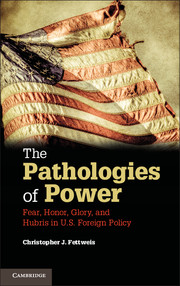Introduction
Pathological Beliefs and U.S. Foreign Policy
Published online by Cambridge University Press: 05 June 2014
Summary
There have been occasions throughout history when war was thrust upon an unwilling and unprepared United States. Those times have been exceptions rather than the rule, however; most of the time when Washington has used force, it has done so by choice rather than necessity, following a period of extensive rumination and debate. No decision was more obviously on the horizon or more widely discussed, for example, than the 2003 invasion of Iraq. For months leading up to the invasion, talking-head programs and op-ed pages were filled with the views of people with all manner of foreign policy qualifications and lack thereof. The possibility of regime change in Baghdad was easily the top issue on the political agenda in 2002. Whatever can be said of the ultimate wisdom of that venture (and much deserves to be, and will be, said), it was not under-considered.
This national debate should have produced a good outcome, at least in theory. In the “marketplace of ideas,” or arena of debate in a free society, the strongest arguments should rise to the surface on the basis of superior logic and evidence, while those built on weaker foundations should sink into oblivion. As John Stuart Mill argued centuries ago, vigorous public debate ought to be the ally of truth and wisdom, producing the best policy outcomes. Why, then, did the final decisions regarding Iraq go so terribly wrong?
- Type
- Chapter
- Information
- The Pathologies of PowerFear, Honor, Glory, and Hubris in U.S. Foreign Policy, pp. 1 - 23Publisher: Cambridge University PressPrint publication year: 2013

